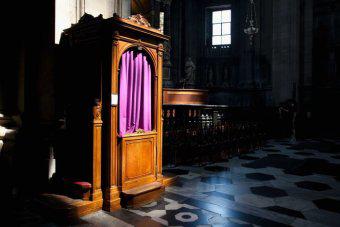|
Breaking the seal of confession could pit church against state
By Noel Debien
Australia's Royal Commission into Institutional Responses to Child Sexual Abuse has just made recommendations that could electrically charge the relationship between church and state.It has advised that legislators in Australian states and territories should enact laws to specifically overrule the confessional seal. The recommendation would require mandatory reporting to police from priests who hear confessions concerning child abuse. The recommendations, if enacted, would place the church and the state in direct legal conflict and would require fundamental change within the international Catholic Church. While priests in other Christians denominations do hear confessions, for many of Australia's five and a half million Catholics the "seal of confession" is a sacred and secret matter, even when it comes to the heinous crime of child abuse. The world's 1.2 billion Catholics are regulated by canon law, and the Pope is its supreme legislator. The current code of canon law states that "The sacramental seal is inviolable; therefore it is absolutely forbidden for a confessor to betray in any way a penitent in words or in any manner and for any reason." Any priest who breaks the seal of confession is subject to the Church's most severe penalty — automatic excommunication, revocable only by the Pope. The royal commission's recommendations would require fundamental change to the theology of the international Catholic Church's sacramental system. In effect, the royal commission is recommending a tectonic doctrinal shift. Ireland passed the Children First Act in 2015, which required mandatory reporting from clergy, and if the experience there is anything to go by Australia may need to ready itself to punish Catholic priests who refuse to break the seal of confession. That's if law enforcement can catch and convict them. The possible penalties for failing to comply are not yet clear. American courts have tried to insist priests break the seal of confession, going so far as to threaten them with jail. Catholic priests have long anticipated such a move.
Professor Brennan was not being overly dramatic. He spoke in consistent agreement with more than a millennium of Catholic practice and law. Melbourne's Archbishop Denis Hart, the president of the Australian Catholic Bishop's conference said in 2011: "I have no hesitation in stating that priests will guard the sanctity of the seal of confession with their very lives. They would certainly undergo imprisonment rather than violate it." But there is nuance here. Canon lawyer Fr Ian Waters testified to the royal commission that if a confession (by for example a child) was about a third party who offended (not the penitent making the confession) then it would not break the seal should a priest report the third party. But this exception would not apply if a paedophile confessed in person, and in that example confessional secrecy would be required under pain of excommunication. Overall though, Catholics believe the matter goes to the fundamental relationship between the church and the state. And Catholic clergy have a long history of civil disobedience. In 1534, St Thomas More famously refused to swear that the church was subject to the king and not the pope. He was executed for it, and was canonised by the church 400 years later. In 2017, the power of the State is once again potentially in conflict with the international jurisdiction of the Pope of Rome. Whatever happens next will be of historic import.
|
.
Any original material on these pages is copyright © BishopAccountability.org 2004. Reproduce freely with attribution.
